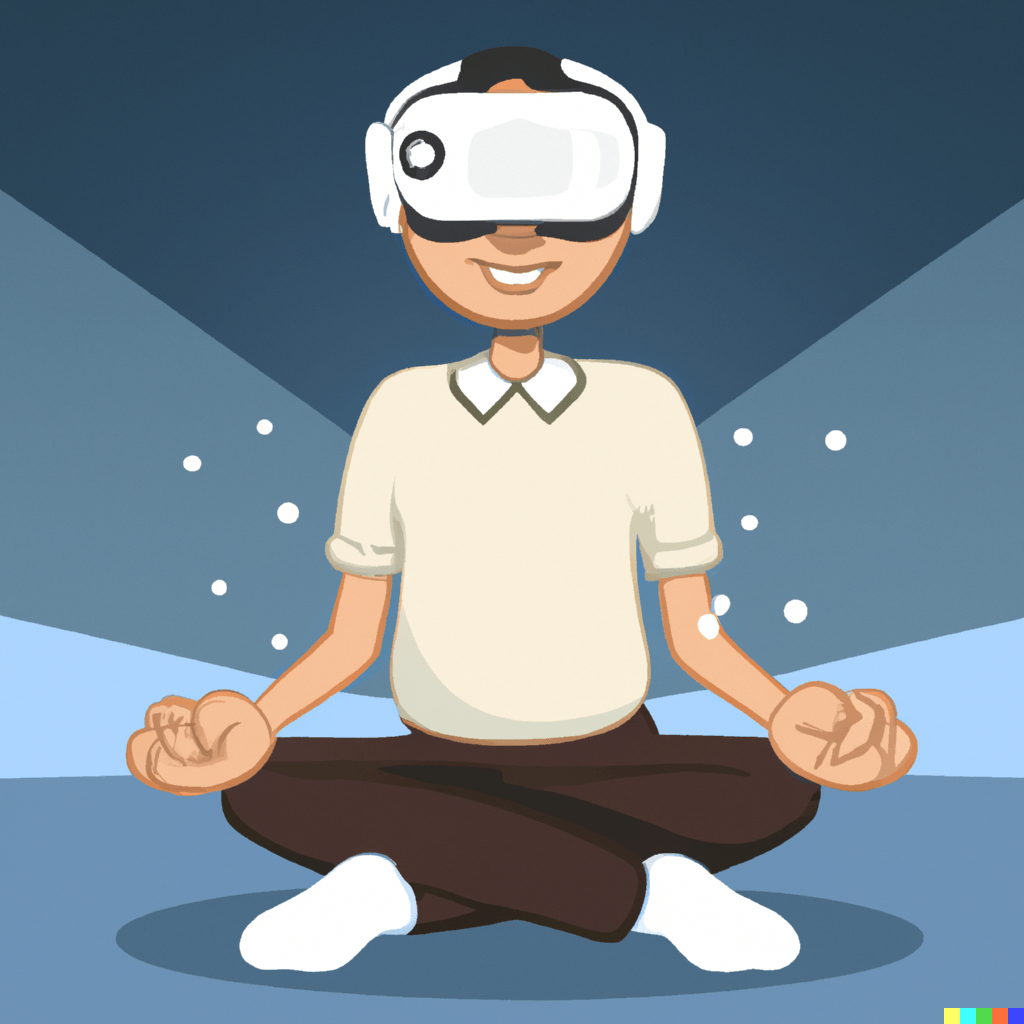Some links on this post may link to affiliate pages that offer compensation to the author of this post.
Meditation has been gaining popularity for years as a method for helping relieve symptoms of anxiety, depression, and stress. In fact, many people are starting to use VR as a method of relaxation through VR meditation. But VR meditation is a new phenomenon that still has many questions like How does VR meditation differ from Traditional Meditation? Are the benefits of VR meditation the same as the health benefits of regular meditation? In our article today, you will learn answers to common VR meditation questions and be able to explore different meditation options.
What is VR Meditation and How is it Different from Traditional Meditation?
Virtual Reality Meditation (VR Meditation) is a form of meditation that uses virtual reality technology to create immersive and interactive experiences. It is different from traditional meditation in that it allows the user to interact with the environment and be more engaged in the process. The use of virtual reality also allows users to access scenarios that are not available in traditional meditation, such as calming natural environments or even outer space. VR Meditation has been found to have cognitive benefits such as improved concentration, relaxation, and stress reduction. It can also help improve mindfulness and provide a deeper understanding of one’s own thoughts and feelings.
Exploring the Benefits of VR Meditation on Stress Relief, Relaxation, & Mental Health
Virtual Reality (VR) meditation is increasingly gaining popularity as a way to reduce stress and improve mental health. Even though historically meditation was a practice designed to be used without technology, there is increasing evidence that the immersion of VR is connected to a deeper and more profound impact over meditation alone.
VR Meditation can be used to help reduce stress levels in the brain by offering an immersive experience designed to lower your heart rate and reduce the constant swirl of negative thoughts, self-talk, and anxiety. Studies have previously indicated that video-based mindfulness program was effective to reduce stress and improve mindfulness skills. According to a 2021 study, “students who were exposed to the VR-based meditation benefited from this relaxation technique more than the students who were exposed to the video-based meditation.”
VR Meditation is an immersive experience that allows users to explore their inner world and find peace in a safe environment. The combination of VR technology and meditation techniques can help people relax, reduce anxiety, and improve overall well-being. This means that VR Meditation can be a helpful way to help relieve your stress and help improve your mental health. If you are interested in giving it a try, check out our most popular article on the best VR meditation apps for the Quest 2 we recently updated for 2023.
What is the Difference Between Real Life & VR Meditation and Which is Better?
How does Virtual Reality (VR) meditation compare to real-life meditation? Which one is better for you? If you are a beginner, VR Meditation is a solid start to developing better mental health. In many meditation circles, they encourage you not to just start meditating alone since you are likely to run into common meditation frustrations. S
- Getting distracted by your own thoughts
- inability to sit still
- discomfort in sitting
- Negative self-talk
If you have experienced these frustrations while trying to meditate, you may want to consider VR meditation. Meditation is hard to do, especially if you are trying it on your own. But with an increased level of immersion, studies have shown it’s easier to get started with VR Meditation if you are looking for non-medicinal ways of relieving anxiety or depression.
Benefits of VR Meditation over Meditation for Relaxation
Many studies show that VR meditation offers a better experience than traditional meditation by itself. In a 2016 study, “high-immersion VR (with a headset) was more effective in deepening the levels of meditation compared with when meditation was practiced via a desktop monitor (without a headset).”
![]() Some have argued that VR meditation is only beneficial because the user is meditating, and the experience is not supplemented by VR. But there are a few VR features that make VR meditation better for some people.
Some have argued that VR meditation is only beneficial because the user is meditating, and the experience is not supplemented by VR. But there are a few VR features that make VR meditation better for some people.
VR Meditation does have a few benefits that traditional meditation does not.
- A deeper level of immersion can help you avoid distractions and stay relaxed longer
- VR Meditation can offer a more diverse range of meditation experiences for deeper mental health benefits
- VR Meditation can help you discover anxiety-grounding techniques to use in traditional meditation
- A better visual and audio interaction helps to incorporate more parts of your brain in the meditation.
Vr meditation is not a perfect medium though and there are some potential drawbacks to VR Meditation.
Disadvantages of VR Meditation and Its Effect On Your Brain
VR meditation is a new experience that has some people worried it may affect their mental state. But there’s no need to worry too much. VR meditation has been shown to be a completely safe method of incorporating mindful mental health benefits into your regular life.
But there are some inconveniences to VR meditation, like:
- VR meditation effects do not seem to last as long as traditional meditation
- VR meditation can be sometimes more distracting for some users than other methods of meditation.
- VR Meditation can be an expensive hobby if you do not already have a VR headset.
If you are new to meditation, don’t let these potential downsides discourage you from giving meditation a try. Especially if you already have a VR headset, there are very good and inexpensive VR meditation apps you can use for better mental health. Check out our article on the best VR meditation Apps for Oculus Quest.
Does VR Meditation Have Any Adverse Effects on Brain Function & Health?
Virtual reality (VR) has been used in a variety of ways, from gaming to therapy. One of these applications is virtual reality meditation, which has become increasingly popular in recent years. But does VR Meditation have any adverse effects on brain function and health?
Virtual Reality has been known to cause some symptoms like headaches and motion sickness, but as the technology has gotten better, people are less likely to experience them! Even people who are prone to motion sickness can use VR headsets like the Quest 2 and have no noticeable side effects from using VR.
Your experience will vary, and it’s commonly reported that in applications with very little “movement” like Beatsaber, or Tripp VR because your character does not move very far. Despite being very movement intensive, the most you will physically move around in your environment is a few feet.
What causes VR motion sickness?
VR Motion sickness is caused by a miscommunication between your inner ear (which controls balance) and your eyes (which help you understand your place in the physical environment.)
The way you balance is largely connected between the two senses of your inner ear and your eyesight. When one of these senses is completely immersed in a separate environment, your body may experience motion sickness.
To help combat motion sickness, most VR titles will offer different methods of transporting your character around their environment.
Potential Dangers of VR Therapy:
Although technology has come a long way in the last few years, VR therapy has some precautions to be aware of. Some users with a history of epilepsy or seizures should exercise caution and consult a medical professional before trying VR therapy.
How to Practice VR Meditation Safely
VR meditation is a relatively safe way to have kids or adults improve their mental health by reducing stress and anxiety. But to have the best experience, you should make sure to do VR meditation with a few precautions.
- Make sure you are in an environment that is safe and with plenty of room around you for stretching out.
- Make sure if you need glasses, you use your glasses inside your headset with a VR spacer or better yet, use a VR lens insert to get your exact prescription in VR.
- Consult a physician if you have any history of seizures or are sensitive to flashing lights.
Using these methods, you should have no issues with VR meditation. But as always, this article is not considered medical advice so if you have concerns regarding VR meditation, it’s always best to speak to a medical professional first.
Best VR Meditation Devices & Accessories for Improved Relaxation
Depending on what kind of headset you have, you may want to pick up a couple of accessories for a more comfortable experience. Our personal favorite VR meditation device is the Quest 2 but most of these accessories can be used with other VR devices as well.
- a good VR cover
- a different VR head strap
- a comfy meditation cushion
A great VR cover or cushion is what sits between your face and the VR headset. If you have used the regular quest 2 VR cushion, you may have noticed it can get really hot and sweaty which is not great if you are prone to acne or just want to take better care of your face.
The quest 2 has a pretty flimsy and hard-to-adjust VR headset which can make it a bit clunky to get it to sit just right on your face. So we use a VR head strap which really helps to improve the VR meditation experience.
Last but not least, a comfy meditation cushion will help you stay comfortable in your meditation position for longer periods of time so we recommend it if you are a novice or a meditation grand master.
Thanks for reading! As a meditation practitioner and a VR enthusiast, I love writing articles about VR and meditation. Please consider subscribing for more articles like this directly in your inbox.
– Preston
Thanks for reading to the end of this post. If you find the information I provide to be helpful, please consider subscribing.
Disclaimer: None of the information presented on this site constitutes legal, business, tax, or medical advice. In each scenario, it’s recommended to first chat with a medical, legal, business, or tax professional before making any decisions.


